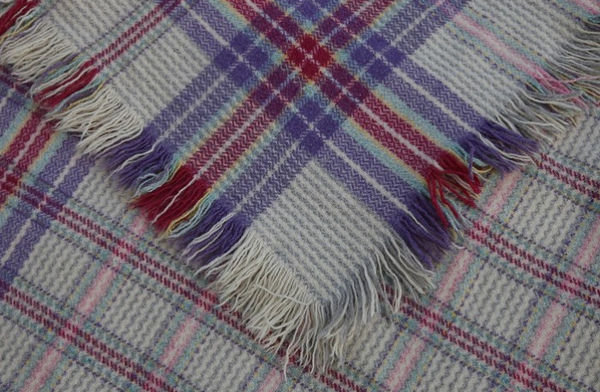
Welcome to our Families History in Weaving
For both Jonathan and Marlene, weaving isn’t just a craft. It’s something far deeper.
Our ancestors worked in the woollen mills of Wales — at the loom and by the fireside, dyeing, spinning, weaving, and washing. On Marlene’s side, her great-aunt Martha Price worked at Penwern Woollen Mill in Cribyn alongside her husband and father-in-law — a small, honest mill powered by people, not machines. Even in its final years, they carried on with dignity and grit, holding on to a way of life that was already slipping into memory.
And on Jonathan’s side, the story is no different. Generations before him worked in wool in Pencader— tied to the valleys of West Wales, where every village had its weavers, and every home had its own story stitched into cloth. Then his story continues across the sea in USA.
This is not distant history. This is personal. This is our heritage.
It’s our ancestry. It’s part of who we are. It’s in our blood. It runs through our veins.
We grew up knowing the feel of real wool, the smell of lanolin, the weight of a blanket that had been passed down, not just bought. These blankets weren’t just useful. They were loved. They were kept safe. They wrapped new babies and warmed old bodies. They were the quiet heart of Welsh homes.
That’s why we continue.
We don’t work with Welsh blankets because it’s fashionable or nostalgic.
We do it because to let it go would be to lose something sacred.
This tradition lives in us. It pulses with memory and pride.
It is not just what we do — it is who we are.
David Humphreys (great, great, great, great grandfather of director Jonathan) had spent his life amidst the rhythmic clatter of the looms. Born in 1848, he was raised in the quiet village of Pencader, South Wales, where the hum of the woollen mills was as familiar as the rolling green hills. By the time he was a young man, he had followed in the footsteps of many before him, working long days in one of Pencader’s two mills, his hands skilled in the ancient craft of weaving.
For decades, he toiled, each thread passing through his fingers a testament to his labour. But by 1900, the world had changed. Wales was struggling, and opportunities seemed scarce. David, now 52, made a decision that would alter the course of his life forever—he would leave his home, his family, and the land he had always known to seek a new beginning across the Atlantic.
The journey was long and uncertain. Crossing the vast ocean, he arrived in America, where the clang of industry echoed through the streets. North Adams, Massachusetts, with its bustling woollen mills, became his new home. The mills were larger, noisier, but the work was familiar—spinning, weaving, dyeing—tasks he had perfected over a lifetime. He built a life in Ward 1, among fellow immigrants who, like him, had left their pasts behind for the promise of something more.
Though he had left Pencader behind, the memory of his homeland must not had faded. In the quiet hours of the evening, he could have run his hands over the fine wool, remembering the soft hills of Wales and the mill where he had spent his youth. He was a man of two worlds, forever bound by the fabric of his trade.
And so, David Humphreys continued to weave—not just wool, but the story of resilience, of a Welshman who had journeyed far, yet carried his heritage with him in every thread he spun.
David Humphrys Story
Born 1848

The Story of Penwern Woollen Mill, Cribyn
A quiet corner of Welsh history, bound in wool and memory.
Tucked away in the gentle hills near Cribyn, Ceredigion, stood Penwern Woollen Mill. Though now long silent, its stones once echoed with the rhythm of looms and the voices of family, hard at work. Among them were John and Martha Price, the last keepers of a centuries-old craft, and kin to Marlene's family line.
Martha Price, aunt to our Grandfather, worked alongside her husband John (1901 censors shows they are married) and his father David to keep the mill alive during its final, difficult years. By the late 1940s, Penwern was described as being in “fair condition,” with two lean-to sheds and machinery for dyeing and finishing wool. The working environment was cramped and untidy—a reflection not of neglect, but of the unrelenting effort it took for a small, family-run operation to survive in an era of industrial change.
At the helm was David Price, a very elderly man by then, helped by his 52-year-old son John and Martha. Together, they carried forward a way of life that had shaped the fabric of Welsh rural industry for generations. The mill produced woven woollen cloth, likely dyed and finished on-site, destined for markets near and far.
But time was catching up. David Price passed away in 1950, and with his death, something intangible left the building too. The estate was left to John Price—his son and woollen manufacturer—but the momentum could not be sustained. Just two years later, in 1952, the mill closed its doors for the last time, quietly fading into dereliction.
Today, the site is a ghost of its industrious past. Stones weathered by wind and time remain, perhaps echoing with the memory of looms, laughter, and a family’s tireless dedication. But through stories like this, and the threads of family that bind us, the legacy of Penwern lives on.
This is more than just a record of a lost mill—it is a tribute to the quiet resilience of people like Martha and David Price, who worked not for glory, but to preserve a livelihood, a tradition, and a sense of place. Their spirit continues to inspire what we do today.
Today the mill has been renovated into living accomondation.

A blanket woven at Penwern, Cribyn.

